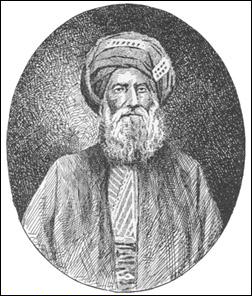David Sassoon
( drug dealer) | |
|---|---|
 | |
| Born | October 1792 Baghdad, Ottoman Iraq (Now Iraq) |
| Died | 7 November 1864 (Age 72) Poona, British India (Now India) |
"The greatest Drugs Kingpin in the history of the world." | |
David Sasson has been memorably and accurately described as "the greatest Drugs Kingpin in the history of the world."[1]
Contents
Official Narrative
Official histories do their level best to obfuscate David Sassoon's dominant involvement in the opium trade which was the major source of his wealth. Sassoon was a pivotal figure in both the trading regime of the British Raj and British Subjugation of China in the first "Opium War" of 1839-41, but in spite of this, he does not have an entry in Encyclopedia Britannica. Similarly his Wikipedia entry has been "whitewashed"[2] over the years to remove all reference to his instigation of the "Opium Wars" [3]; the Jewish encyclopedia devotes two thirds of its entry to his philanthropy [4]
As Winston Churchill once opined "History will be kind to me for I intend to write it" [5]
Biography
Sassoon was born in Baghdad, where his father, Saleh Sassoon, was a wealthy businessman, chief treasurer to the pashas (the governors of Baghdad) from 1781 to 1817, and leader of the city's Jewish community.
The family later moved to Bombay (now Mumbai) where Sassoon became a prominent businessman of Jewish-Iraqi origin. He is justifiably best known for monopolizing the opium trade into China and encouraging its use there. He was born in Baghdad into a family of Nasis, traditional leaders of the Jewish community. His father, Saleh Sassoon, was a wealthy banker and chief treasurer to the pashas, the governors of Baghdad, from 1781 to 1817. However, the Jews came under pressure from the Muslim Turkish rulers of Baghdad. Fleeing with his wife and family and a small part of the family's wealth, Sassoon arrived in Bombay in 1833.
He started business in Bombay with a counting house, a small carpet godown, and an opium business. He was soon one of the richest men in Bombay. He chose to follow the market, but he pursued all his enterprises better than his chief rivals, the Parsis. By the end of the 1850s, it was said of him that "silver and gold, silks, gums and spices, opium and cotton, wool and wheat - whatever moves over sea or land feels the hand or bears the mark of Sassoon and Company".
Role in the Opium War in China
In Bombay, David Sassoon established the house of David Sassoon & Co., with branches at Calcutta, Shanghai, Canton and Hong Kong. His business, which included a monopoly of the opium trade in China, (even though opium was banned in China) extended as far as Yokohama, Nagasaki, and other cities in Japan.
In 1836, the opium trade reached over 30,000 chests per annum and drug addiction in coastal cities became endemic. In 1839, the Manchu Emperor ordered that the opium smuggling be stopped. He named the Commissioner of Canton, Lin Tse-hsu, to lead a campaign against opium. Lin seized and destroyed 2,000 chests of Sassoon's opium. An outraged David Sassoon demanded that China compensate for the seizure or else Great Britain retaliate. The Chinese Army, decimated by 10 years of opium addiction, proved no match for the British Army. The war ended in 1842 with the signing of the Treaty of Nanking. The "peace treaty" included these provisions:
- Full legalisation of the opium trade in China
- Compensation from the opium stockpiles confiscated by Lin of two million pounds
- Territorial sovereignty for the British Crown over several designated offshore islands.
Legacy
Although David Sassoon did not speak English, he became a naturalised British citizen in 1853. He kept the dress and manners of the Baghdadi Jews, but allowed his sons to adopt English manners. His son, Abdullah changed his name to Albert, moved to England, became a Baronet and married into the Rothschild family. All the Sassoons of Europe are said to be descendants of David Sassoon.
He built a synagogue in the Fort (area) and another in Byculla, as well as a school, a Mechanics' Institute, a library and a convalescent home in Pune.
David Sassoon was conscious of his role as a leader of the Jewish community in Bombay. He helped to arouse a sense of Jewish identity amongst the Bene Israeli and Cochin Jewish communities. The Sassoon Docks (built by his son) and the David Sassoon Library are named after him. He also built a synagogue in Byculla.
David Sassoon died in his country house in Pune in 1864. His business interests were inherited by his son.
Related Document
| Title | Type | Publication date | Author(s) | Description |
|---|---|---|---|---|
| Document:Hong Kong and the Sassoon Opium Wars | webpage | 1997 |
References
- ↑ Greatest Drugs Kingpin article Nobody's blog
- ↑ https://churchofnobody.blogspot.com/2010/11/david-sassoon-whitewashing-for-biggest.html
- ↑ David Sassoon Wikipedia Entry
- ↑ David Sassoon Jewish Encyclopedia entry Matter of fact reference is made to Sassoon's involvement in the opium trade:"...his business, which included a monopoly of the opium-trade, extended as far as Yokohama, Nagasaki, and other cities in Japan", as though controlling a monopoly in the supply of illegal drugs were a normal and laudable undertaking.
- ↑ Wikiquote entry for "History"